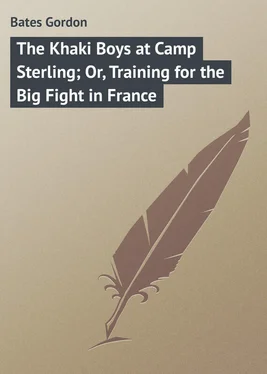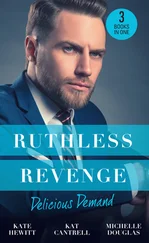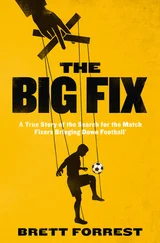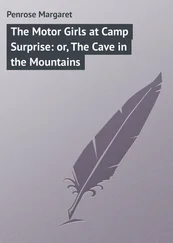Gordon Bates - The Khaki Boys at Camp Sterling; Or, Training for the Big Fight in France
Здесь есть возможность читать онлайн «Gordon Bates - The Khaki Boys at Camp Sterling; Or, Training for the Big Fight in France» — ознакомительный отрывок электронной книги совершенно бесплатно, а после прочтения отрывка купить полную версию. В некоторых случаях можно слушать аудио, скачать через торрент в формате fb2 и присутствует краткое содержание. Жанр: foreign_prose, на английском языке. Описание произведения, (предисловие) а так же отзывы посетителей доступны на портале библиотеки ЛибКат.
- Название:The Khaki Boys at Camp Sterling; Or, Training for the Big Fight in France
- Автор:
- Жанр:
- Год:неизвестен
- ISBN:нет данных
- Рейтинг книги:5 / 5. Голосов: 1
-
Избранное:Добавить в избранное
- Отзывы:
-
Ваша оценка:
- 100
- 1
- 2
- 3
- 4
- 5
The Khaki Boys at Camp Sterling; Or, Training for the Big Fight in France: краткое содержание, описание и аннотация
Предлагаем к чтению аннотацию, описание, краткое содержание или предисловие (зависит от того, что написал сам автор книги «The Khaki Boys at Camp Sterling; Or, Training for the Big Fight in France»). Если вы не нашли необходимую информацию о книге — напишите в комментариях, мы постараемся отыскать её.
The Khaki Boys at Camp Sterling; Or, Training for the Big Fight in France — читать онлайн ознакомительный отрывок
Ниже представлен текст книги, разбитый по страницам. Система сохранения места последней прочитанной страницы, позволяет с удобством читать онлайн бесплатно книгу «The Khaki Boys at Camp Sterling; Or, Training for the Big Fight in France», без необходимости каждый раз заново искать на чём Вы остановились. Поставьте закладку, и сможете в любой момент перейти на страницу, на которой закончили чтение.
Интервал:
Закладка:
Josephine Chase
The Khaki Boys at Camp Sterling / Training for the Big Fight in France
CHAPTER I
THE GLORY ROAD TO FRANCE
“You, over there in the crowd, and you and you , why don’t you get busy and help Uncle Sam? What are you hanging back for? Now’s your chance to show that you’re a real American, and ready to fight for your country. What’s the use of waiting for the draft to get you? You’re just wasting time! The sooner you enlist, the sooner you’ll be ready to do your bit in France. It’s up to good old Uncle Sam to jump into the big war and win it. But he can’t do it alone. It needs a lot of brave, husky fellows to lick the Boches off the map. Are you going to be one of ’em? Every little bit helps, you know!
“Now we’re going to sing you one more song. While we’re singing it, get on the job and think hard. We want to take a bunch of you back with us to the recruiting station. All right, boys. Give ’em ‘The Glory Road to France!’”
Standing in the middle of a big recruiting wagon, lavishly decorated in red, white and blue, the orator, a good-looking young soldier of perhaps twenty years, bawled out, “Let ’er go!”
From one end of the wagon rose the strains of a lively air, enthusiastically hammered out on a small, portable piano by another khaki-clad youngster, seated on a stool before it. Gathered about him, half a dozen clean-cut soldier boys immediately took it up. The sheer catchiness of the melody, tunefully shouted out by the singers, had its effect on the crowd. The sturdy quality of the words, too, brought a flash of newly aroused patriotism to more than one pair of eyes belonging to the throng of persons closely packed about the big wagon. It appeared to deepen with the lustily given chorus:
“Take the Glory Road for France,
Hike along to join the fray,
With the Sammies take a chance
’Neath the Stars and Stripes to-day.
At the front brave men are falling,
Now’s your time to do and dare.
Don’t you hear your Uncle calling,
‘Boys, I need you “Over There”!’”
At the extreme edge of the crowd, a gaily painted roadster had come to a full stop, its progress temporarily checked by the mass of persons about the wagon. It was a four-cylinder car, built low, with one gasoline tank behind the seat and still another behind it, a small reserve. The body of the roadster, painted a bright green, stood out sharply by reason of the red wire wheels. The doorless entrance at one side formed a neat “U,” while the extra tires, also mounted on red wire wheels, strapped on at the rear, gave it a last additional touch. Plainly it was built for speed and had a mischievous, runaway air about it that accorded curiously with its driver, a gray-eyed, sunny-haired young man of perhaps eighteen, whose clean-cut features bore an expression of reckless good humor that immediately stamped him as one of those wide-awake, restless lads in whom the love of mischief is ingrained.
Forced to slow down and halt his car by the ever-waving arm of a traffic policeman, he now leaned forward over the wheel, his attention fixed on the singers. He had come upon the scene at the moment when the youthful orator had commenced his harangue. Further, he had been one of those whom the latter had addressed as “you.” From a good-humored grin, his boyish mouth had gradually grown grave as he listened. First sight of the recruiting wagon had recalled to Jimmy Blaise a matter which had been troubling him ever since the United States had declared war against Germany. The only son of an intensely patriotic father and mother, despite his love of fun Jimmy had done some serious thinking about the big war.
At the last ringing line of appeal, “Boys, I need you ‘Over There,’” involuntarily Jimmy spoke his mind aloud. “I guess that’s right,” he agreed, with a vigorous wag of his head.
A boy standing close to the roadster caught the remark and glanced levelly at the speaker. In his dark blue eyes there was an answering flash which the other lad caught and read aright. For an instant the two stared at each other in silence.
“How about it?” demanded Jimmy genially.
“I guess Uncle Sam needs us all right enough,” the blue-eyed boy replied, his sober face lighting into a singularly sunny smile. “I’ve thought a lot about it. I’d like to go.”
“Put her there!” The youth in the car leaned down and shot out a friendly hand. “I’ve been thinking about it myself. I can go to-morrow, that is, if I get accepted. I asked my folks the other night what they’d do if I enlisted. I’m not twenty-one, you see. Quite a long way from it. Won’t be nineteen until next November.”
“What did they say?” questioned the other eagerly.
“They both said it was up to me. They’re not slackers. I can just tell you that. Of course, my mother looked kind of sad for a minute; then she braced up and said she’d be proud to have a soldier son. My father said if he was young enough he’d enlist himself. That shows pretty plainly what sort of stuff they’re made of.”
“I should say so,” emphasized the blue-eyed boy. “I was nineteen last month. My father and mother are both dead. I take care of myself. So you see there isn’t anyone to care – ”
“Gee whiz, that’s tough,” sympathized Jimmy. “Say, I like you. You’re all right. What do you say? Let’s enlist. Yes? No ride in that recruiting wagon for me, though. Look! They’ve got four fellows already! That Glory Road song waked ’em up, I guess. Tell you what you do. Jump into my roadster and we’ll get away from here and be at the station ahead of those fellows. This car can certainly go some. I call it ‘Old Speedy.’ If we were out in the country on a good smooth road I’d give you a fast ride, all right. Course I have to go easy in the city. But climb in and let’s beat it. Those Sammies in the wagon are getting ready to move on. What’s the matter? You’re not going to back out, are you?” Quick to note a trace of hesitation in his new acquaintance’s manner, the gray-eyed boy’s straight brows drew together in a disappointed frown.
“Back out? Well, I guess not.” With this the other boy hopped nimbly up to a seat beside the driver. “It’s fine of you to do this,” he burst forth impulsively. “Why, you don’t even know my name or – ”
“Oh, can it,” grinned Jimmy. “I took a good look at you. That’s enough. I always know when I first see a fellow whether I’m going to like him or not. I don’t change my mind about him, either. Now I’m going to back out of here in a hurry. I’ll turn around up the street, then cut down a side street and hit it up for the recruiting station.”
With this Jimmy busied himself with his car and soon had it backed far enough to make the turn. As it glided into the side street, his companion glanced over one shoulder at the crowd they had left behind. “It looks as if they were going to start,” he commented.
“Let ’em start. We’ll beat ’em to it,” predicted Jimmy. “I’ll run as fast as I dare. Say,” he continued, as they spun along over the smooth pavement, “as long as we enlist together, we’ll probably be sent to the same training camp. Then we’ll be pals. How’s that? My name’s James Sumner Blaise. My folks call me Jimmy and the fellows call me Jimmy Blazes.”
His companion smiled at this funny nickname. He was already under the spell of Jimmy’s careless, happy-go-lucky manner.
“I’d like to be pals,” came his hearty response. “My name’s Roger Barlow. I’ve been working in a munitions plant ever since the war in Europe began. I used to be in the shipping room of a big hardware place. I didn’t make very good wages, so I left it for munitions. This is the first Saturday afternoon I’ve had off for three months. I’ve earned quite a lot of money and I’ve got almost a hundred dollars saved up,” he added confidentially.
Читать дальшеИнтервал:
Закладка:
Похожие книги на «The Khaki Boys at Camp Sterling; Or, Training for the Big Fight in France»
Представляем Вашему вниманию похожие книги на «The Khaki Boys at Camp Sterling; Or, Training for the Big Fight in France» списком для выбора. Мы отобрали схожую по названию и смыслу литературу в надежде предоставить читателям больше вариантов отыскать новые, интересные, ещё непрочитанные произведения.
Обсуждение, отзывы о книге «The Khaki Boys at Camp Sterling; Or, Training for the Big Fight in France» и просто собственные мнения читателей. Оставьте ваши комментарии, напишите, что Вы думаете о произведении, его смысле или главных героях. Укажите что конкретно понравилось, а что нет, и почему Вы так считаете.












